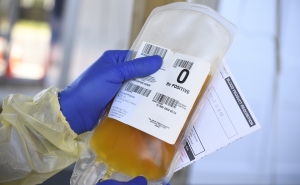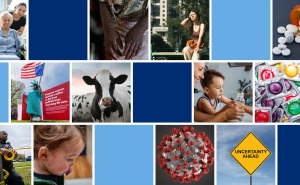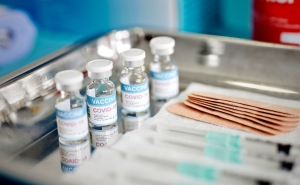Increasing access to COVID-19 testing via IVF research
Pandemic pivot: A PhD candidate discovers his research on the environmental health drivers of infertility could be used to help improve testing access for COVID-19

EHE Doctoral student Micajah Mcgarity
Sarah Achenbach / Published Aug 3
This story originally appeared in the Summer 2021 issue of JHU Engineering
The COVID-19 stay-at-home orders in March 2020 shut down the research that Micajah McGarity, a PhD candidate in the geography and environmental engineering program in the Whiting School, had been doing on the environmental health drivers of infertility. McGarity, who earned his master's degree in geography and environmental engineering in 2012, had been focusing on creating optimization models to make fertility services more widely accessible.
Then it hit him. His research could be used to help improve testing access for COVID-19. "At the time, there was a big need for improved access to COVID testing," says McGarity, the M. Gordon Wolman Fellow.
"I had the infrastructure in place, so I began searching for lists of drive-up COVID-19 testing centers across the country."
Using data from GoodRx, a website and mobile app that finds discount prices for medications, McGarity determined that opening 250 new center locations in optimal locations could extend drive-up testing to within a 60-minute drive for about 100 million people around the United States. He created the COVID-19 Drive-Up Testing Dashboard, hoping to provide information that would assist Johns Hopkins and other national public health agencies in responding to COVID-19.
More recently, McGarity has returned to addressing disparities in fertility treatment access—which is much more than an exercise in optimization methodology for him. He and his wife, Sara (who he met working in the same research group at Johns Hopkins), are among the approximately one in eight couples affected by infertility in the U.S. Their experience inspired McGarity's research focus when he enrolled in the Whiting School's part-time PhD program in the Department of Environmental Health and Engineering. An operations research analyst at Johns Hopkins' Applied Physics Lab, McGarity uses the tools of optimization, probability, and statistics to improve the safety and security of U.S. Navy submarines.
"My wife and I were lucky and didn't have issues accessing fertility care, but I learned that most couples in the U.S. are not so lucky, with only about 40% of demand met for in vitro fertilization," says McGarity, who holds a WSE/APL Research Assistantship. "Of the many barriers to access, I found that about 29% of those in the reproductive age population do not live in an area with an IVF clinic, and I knew that I could apply engineering to the challenge of increasing access."
He collected data from every U.S. fertility clinic to create the national Fertility Clinic Finder. Currently, he's developing a dashboard like the one he created for COVID-19 testing locations to help existing and new reproductive endocrinologists determine the optimal placement of new clinics. The McGaritys, who have two children, used his data to find a new clinic for continuing treatment once the clinic they were using closed permanently in summer 2020 due to the pandemic.





